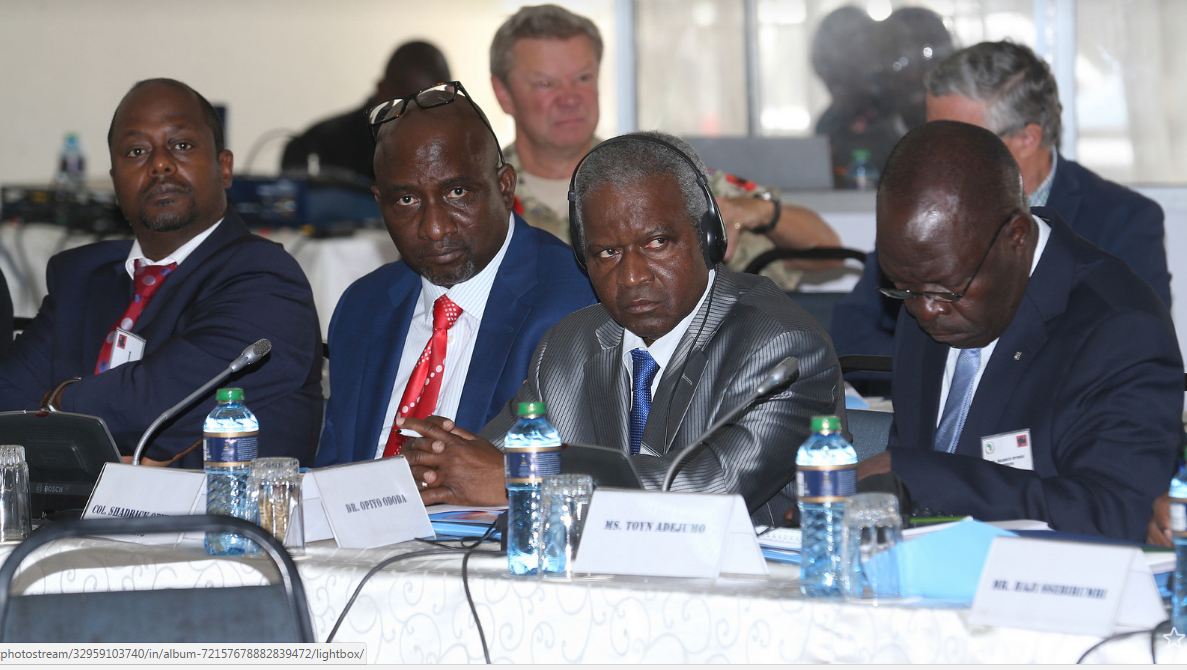AMISOM takes stock of its operations in Somalia in the last decade

AMISOM is seeking a new approach to bringing peace and stability to Somalia.
The AU Special Representative for Somalia and Head of AMISOM Ambassador Francisco Caetano Madeira told a high-level meeting of AU officials, donors and other stakeholders, that the current arrangement that relies on military onslaught against the Al Shabaab militants may not achieve its desired goals, of delivering sustainable stability in the Horn of Africa country.
Ambassador Madeira is asking for a surge in AMISOM troops, to help the new Somalia government and its security forces exercise authority over areas already liberated by the Mission.
“We are now ten years, we have achieved a lot (in the past ten years); we are keeping the government in place; nobody can question that. We are keeping the regional governments in place; we supported the two elections, the latest one, we secured that election; and the president was elected in a very consensual way; we did all these things,” Madeira observed.
AMISOM has been in Somalia for exactly a decade this week. Thus, the two-day meeting in the outskirts of Kenya’s capital Nairobi, is taking stock of the Mission’s performance within that period and charting the next way forward.
The meeting is part of events that culminate in May, to mark ten years of the Mission’s presence in Somalia.
Ambassador Madeira said the Somalia security forces in their current state cannot adequately exercise authority on areas liberated by AMISOM. “The way we handled it militarily is that we’d go there, flash out Al Shabaab and protect the government. We then started training Somalis to take over. We were to liberate Mogadishu (Somali Capital). We felt that we’d do it and the Somalia National Army (SNA) would come in later.”
He stated that SNA has its inadequacies and has not been able to take full charge of Somalia’s security, as it should. “Those who should be fighting expect us to protect them,” he said, adding that AMISOM was fighting Al Shabaab and protecting the Federal Government of Somalia, at the same time.
“It’s time we made it known that AMISOM is not going to stay forever,” he noted.
Pertinent, is to form a full functional national Army, have government exercise authority and address the problems facing the population – historical clan rivalry, land ownership and sharing, power sharing, and reasons that attract the youth to the Al Shabaab, the Head of AMISOM advised.
“They (Somalis) have to have an army. And how will that be done? I think again we have identified; these things must be done concomitantly, and what are the things that need to be done concomitantly? We have to form the army, we have to help the government to exercise its authority all throughout the country and we have to have the government address the real problems that are dividing the people of Somalia.”
He drew parallels between the Somalia strife and the terrorism conflict that almost tore apart Algeria and said it was possible to bring peace to the former.
“Algeria succeeded in ending the conflict. They trained their forces.”
“What we are doing in Lower Jubba is what we should have done from the beginning,” he explained, in apparent reference to a region in South Central Somalia, where the SNA and AMISOM troops have actively encountered Al Shabaab.
He urged donors to stay with Somalia at this critical hour, when the country has a promising and forward-looking federal government.
Apart from additional troops, the Mission also requires more funds to engage in a comprehensive approach to peace, which involves not just military response, but also mediation, negotiation and engaging an all-inclusive mechanism to conflict resolution.
“It is also clear that as the mission moves into the next challenging phase of security transition, it should engage with the diverse range of distinguished experts as represented here to ensure the best practise is understood and a clear way forward identified,” Colonel Richard Leakey, the Commander of the British Peace Support Team in Eastern African (BPST-EA) told the meeting.
He described the meeting in Nairobi as critical because its outcome would be a “stepping stone” to talks scheduled May in London, United Kingdom, expected to draw a comprehensive architecture for peace in Somalia. Britain is sponsoring and facilitating the Nairobi meeting.
“London is very interested in these talks,” he said, expressing his gratitude to the African Union Commission for taking up the idea to stabilize Somalia. He added to say that the people in Somalia deserve a chance for a new beginning.
Maj. Gen. Francis Okello, AMISOM former Force Commander, is representing the African Union Commission (AU Commission) at the meeting. He said the outcome of the deliberations would “provide basis for strategic engagement and future of AMISOM”.
The Commission “expects frank, critical, forward-looking and constructive engagement (at the meeting),” Maj. Gen Okello said.
He thanked the BPST-EA for facilitating the workshop.